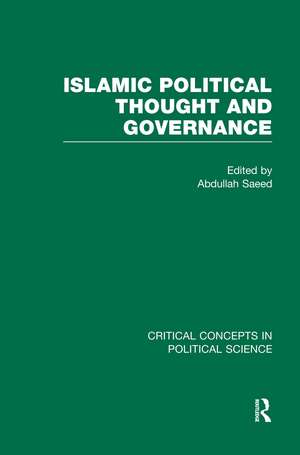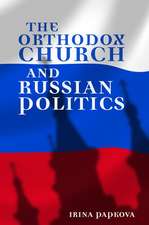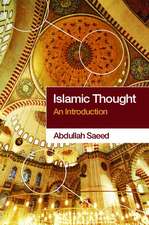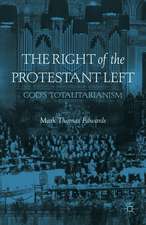Islamic Political Thought and Governance: Critical Concepts in Political Science
Editat de Abdullah Saeeden Limba Engleză Hardback – 16 noi 2010
This new Routledge Major Work collection is concerned with the development of political thought in Islam. By political thought is meant, broadly, the study and interpretation of Islamic political culture, ideas, beliefs, and institutions; the contribution of key political theorists and authorities to the understanding or practice of governance; what people and groups believed about political authority and institutions and their political convictions; and how politics in the Islamic world has related to and interacted with other disciplines, such as religion, law, ethics, and philosophy.
Although contemporary issues in Islamic political thought are very much in the public focus at the moment, this set also focuses on the history and development of Islamic political theories and thought, from their inception until the twentieth century. Political thought in the Muslim world is connected to its history and by understanding the past, those who study contemporary political thought will have a better grounding to understand current and future developments.
Moreover, understanding how Islamic political thought developed also helps shed light on the political thought of other civilizations, such as Western political thought. Political thought in Islam did not develop in isolation—it responded to and interacted with the political institutions and theories of other civilizations throughout history.
Din seria Critical Concepts in Political Science
- 34%
 Preț: 5212.31 lei
Preț: 5212.31 lei - 34%
 Preț: 5929.91 lei
Preț: 5929.91 lei - 34%
 Preț: 5226.18 lei
Preț: 5226.18 lei - 34%
 Preț: 4752.83 lei
Preț: 4752.83 lei - 34%
 Preț: 4540.12 lei
Preț: 4540.12 lei - 34%
 Preț: 4939.47 lei
Preț: 4939.47 lei - 34%
 Preț: 5499.64 lei
Preț: 5499.64 lei - 34%
 Preț: 5208.29 lei
Preț: 5208.29 lei - 34%
 Preț: 4377.30 lei
Preț: 4377.30 lei - 34%
 Preț: 5633.96 lei
Preț: 5633.96 lei - 34%
 Preț: 6186.86 lei
Preț: 6186.86 lei - 34%
 Preț: 6741.21 lei
Preț: 6741.21 lei - 34%
 Preț: 7868.87 lei
Preț: 7868.87 lei - 34%
 Preț: 5348.23 lei
Preț: 5348.23 lei - 34%
 Preț: 7318.32 lei
Preț: 7318.32 lei - 34%
 Preț: 7318.72 lei
Preț: 7318.72 lei - 34%
 Preț: 7295.48 lei
Preț: 7295.48 lei - 34%
 Preț: 7301.60 lei
Preț: 7301.60 lei - 34%
 Preț: 4237.71 lei
Preț: 4237.71 lei - 34%
 Preț: 6743.26 lei
Preț: 6743.26 lei - 34%
 Preț: 6739.59 lei
Preț: 6739.59 lei
Preț: 3960.26 lei
Preț vechi: 5974.45 lei
-34% Nou
Puncte Express: 5940
Preț estimativ în valută:
757.96€ • 788.25$ • 634.26£
757.96€ • 788.25$ • 634.26£
Carte tipărită la comandă
Livrare economică 15-29 martie
Preluare comenzi: 021 569.72.76
Specificații
ISBN-13: 9780415498685
ISBN-10: 0415498686
Pagini: 1680
Dimensiuni: 156 x 234 x 135 mm
Greutate: 3.27 kg
Ediția:1
Editura: Taylor & Francis
Colecția Routledge
Seria Critical Concepts in Political Science
Locul publicării:Oxford, United Kingdom
ISBN-10: 0415498686
Pagini: 1680
Dimensiuni: 156 x 234 x 135 mm
Greutate: 3.27 kg
Ediția:1
Editura: Taylor & Francis
Colecția Routledge
Seria Critical Concepts in Political Science
Locul publicării:Oxford, United Kingdom
Cuprins
Volume I Part 1: Pre-Islamic Tribal Tradition Part 2: Muhammad and the Birth of a New Political Society Part 3: The Caliphal Status of the Rightly Guided Caliphs Part 4: Early Schisms and the Formation of the Sects Part 5: The Khariji and Mu’tazili Opposition and their Idea of the Caliphate Part 6: The Shi’a Opposition Part 7: Sunni Doctrines and the State Part 8: Some Key Sunni Theologian Scholars Part 9: Shi’i Notions of the Caliphate/Imamate Part 10: The Umayyad Caliphate Part 11: The Umayyads in the West Part 12: The Idea of Caliphate Under the Abbasids Volume II Part 13: Theories and Styles of Leadership Among the Sunnis Part 14: The Ottoman State Part 15: The Mughals of India Part 16: Later Theories and Styles of Leadership Among the Shiites Part 17: War and Foreign Relations Part 18: Non-Muslim Minorities Volume III Part 19: The Notion of Umma Part 20: The Military and Military Politics Part 21: Kinship Part 22: Slaves Part 23: Sufism and Sufi Orders Part 24: Elements of Civil Society Part 25: Law and Administration of Justice Volume IV Part 26: The Fragmentation of the Ottoman Empire Part 27: Westernization Part 28: Conservatism and Pan-Islamism Part 29: Pan-Islamism Part 30: Democratization of Authority Part 31: Islam and Socialism/Marxism Part 32: Islam and Nationalism Part 33: Fundamentalism and Radicalism Part 34: The Shiite World: The Iranian Revolution and Walayat al-Faqih Part 35: Challenges and Prospects Part 36: Women Part 37: Totalitarianism
Descriere
This new Routledge Major Work is concerned with the development of political thought in Islam. By political thought is meant, broadly, the study and interpretation of Islamic political culture, ideas, beliefs and institutions; the contribution of key political theorists and authorities to the understanding or practice of governance; what people and groups believed about political authority and institutions and their political convictions; and how politics in the Islamic world has related to and interacted with other disciplines, such as religion, law, ethics, philosophy and statehood.















